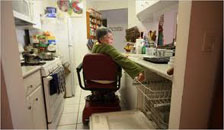Housing for Disabled

Housing is important for the independence and dignity of disabled people. It provides a basic foundation for developing and growing, for developing confidence, for learning new skills, getting employment, contributing to the economy and society, and for socialising and interacting with society. If facilitates social inclusion. Yet many disabled people are cut off from housing due to the nature of their disability, to unemployment, discrimination, poverty, low wages, high (over-inflated) property prices, etc. and many have had to endure sub-standard accommodation in the private rented sector. In NCPD, we aim to help disabled people overcome these difficulties, through representing them on important housing bodies and working on their behalf and through lobbying government ministers and TD's at national level, and consultation in the development of new laws, new national disability strategies and the ongoing implementation of the Sectoral Plans.
National Level
The Department of Environment, Heritage and Local Government has a Sectoral Plan which covers housing for disabled people. At national level, NCPD will continue the work of PWDI, working with government ministers and senior civil servants to monitor and assess progress in the implementation of this plan.
You can download the Sectoral Plan - Department of the Environment, Heritage and Local Government . (This Sectoral Plan is in PDF file format. PDF files have been made more accessible to disabled people. Click on this sentence to view important information about PDF files and accessibility.).
Further updates to this Sectoral Plan include:
Local Level
NCPD in Galway is seeking representation or has got representation on the following bodies so as to represent and work for the interests of all disabled people on these bodies
- Social Housing, Galway City Council
- Social Housing, Galway County Council
We work with the Galway City Council and Galway County Council, with the aim or objective of securing housing for all disabled people who are in need of housing. Some disabled people require accessible buildings, while others may not require this. The requirements of disabled people vary from dissability to disability.housing.
Galway City Council

Social Housing
To apply for Social Housing you can get a copy of the forms from the Housing Section at: The Housing Section, Galway City Council, College Road, Galway Tel: 091 536508 or 091 536434
Make sure all the documentation outlined in the Application Form is submitted with your application. If any of the documentation is missing, the application for housing will be deemed invalid and will be returned to you. The waiting time for the assessment of housing application is approximately 6 weeks from the date of receipt. You should note that this period may be extended if further information/clarification is requested before the final assessment. Once an assessment has been carried out for housing application, notification is given in writing. You are required to notify the housing section of any change in your circumstances for example change of address, family size, income so that they can keep your file up-to-date
Social Housing
Rental Accommodation Scheme (RAS)
Housing Adaption Grants for Disabled People and Retired Elderly People
- Housing adaption grants for disabled people and the elderly
- Housing Grant for People with a Disability
- Housing Aid for Older People
- Mobility Aids Housing Grant Scheme
Low cost Mortgages and Loans
- Tenant Purchase Scheme
- Shared Ownership Scheme
- Mortgage Allowance Scheme
- Improvement Works Scheme in Lieu of Housing
Affordable Housing
Address: Galway City Council, City Hall, College Road, Galway. Open: 9am - 4pm.
Phone: 091 536400 Fax: 091 567493
Email: customerservice@galwaycity.ie
Website: www.galwaycity.ie
NCPD Representative: to be decided
Galway County Council

Galway county Council handles social housing in Galway county, outside Galway city. You can get information about social housing, grants for disabled people, housing loans, affordable housing, shared ownership, etc. at the following: http://www.galway.ie/en/Services/Housing/
Address: Housing Department, Galway County Council, Aras an Chontae, Prospect Hill, Galway. Opening Hours: 9am - 4pm Monday - Friday
Phone: 091 509301 Fax No: 091 509299
Email: housing@galwaycoco.ie
Website: http://www.galway.ie
NCPD Representative: to be decided
Back to top of page
Learning from other countries - International Standards & Excellence
It is important to learn from the experiences of other developed countries. Over long periods of time, other countries have tried and tested many different options, and refined and improved succesful ones, while also innovating and developing new technologies, new systems, new laws and regulations. Some countries provide models of excellence in certain areas of disability rights and social inclusion.
- Guide to Home Remodeling for Disability: http://www.expertise.com/home-and-garden/home-remodeling-for-disability-and-special-needs
